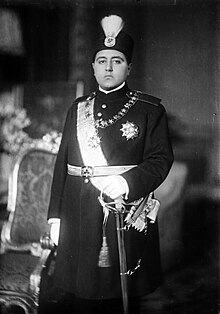Ahmad Shah Qajar
| Ahmad Shah Qajar احمد شاه قاجار |
|||||
|---|---|---|---|---|---|
Shahanshah of Persia |
|||||
 |
|||||
| Shah of Persia | |||||
| Reign | 16 July 1909 – 15 December 1925 | ||||
| Predecessor | Mohammad Ali Shah Qajar | ||||
| Successor | Reza Shah Pahlavi | ||||
| Regent |
Ali Reza Khan Azod al-Molk |
||||
| Born |
21 January 1898 Tabriz, Azerbaijan, Persia |
||||
| Died | 21 February 1930 (aged 32) Neuilly-sur-Seine, Paris, France |
||||
| Burial | Karbala, Iraq | ||||
| Spouse | Badr-almoluk | ||||
| Issue Among others... |
Irandokht Fereydoun Mirza Qajar |
||||
|
|||||
| Dynasty | Qajar | ||||
| Father | Mohammad Ali Shah | ||||
| Mother | Malekeh Jahan | ||||
| Religion | Shia Islam | ||||
| Tughra |  |
||||
| Full name | |
|---|---|
| Soltan Ahmad Shah Qajar |
Ahmad Shāh Qājār (Persian: احمد شاه قاجار; January 1898 – 21 February 1930) was Shah of Persia from 16 July 1909, to 15 December 1925, and the last ruling member of the Qajar dynasty.
Ahmad Shah ascended to the Sun Throne on 16 July 1909, following the overthrow of his father and predecessor, Mohammad Ali Shah, who had attempted to reverse earlier constitutional restrictions on royal power, and thus enraged the majority of Persians. It is alleged that Ahmad Shah was one of the most selfish kings of Iran while others regard him as a strong ruler, interested in attending to the matters of government.
After removing Muhammad Ali Shah from power, the Grand Majles placed Ahmad Shah on the throne. The Grand Majles consisted of 500 delegate members who came from different backgrounds. They held a special tribunal in order to punish all those who participated in the civil war, among those hanged was Sheikh Fazlollah Nuri. They also brought in new reforms that were not seen in Persia before. They abolished class representation; created five new seats for the minorities in the Majles (Persian parliament); the Armenians got two seats, other religious minority groups such as Jews, Zoroastrians and Assyrians each got one seat in the new government; the Majles also democratized the electoral system; diminished the electoral dominance of Tehran and even lowered the voting age from twenty five to twenty.
Not much is known about Ahmad's early life prior to his ascendancy to the throne. He was very attached to his father. After his father left, Ahmad felt isolated and bitter. Due to his young age, a regent, his uncle Ali Reza Khan Azod al-Molk, took charge of his affairs. However, his lavish lifestyle did not gain him any favors with the Persian people. Ahmad Shah inherited a kingdom in turmoil, and a constituency frustrated with British and Russian imperialism and the absolute rule of his father.
...
Wikipedia
